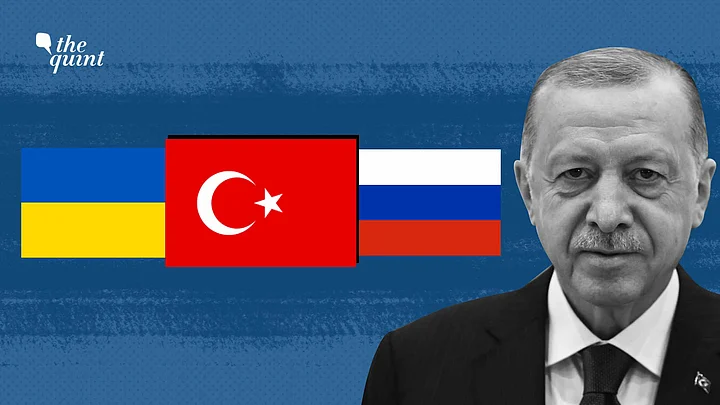Turkey, on Wednesday, 10 March, hosted talked between Dmytro Kuleba and Sergei Lavrov, the foreign ministers of Ukraine and Russia respectively.
The talks, however, ended without a ceasefire, as Russian attacks continue to devastate several parts of Ukraine like Mariupol, where thousands have lost access to food, water, and electricity.
Turkish President Recep Tayyip Erdoğan even spoke to US President Joe Biden after the aforementioned talks, and stressed the importance of mediation and peace.
So, why is the resolution of this conflict so important to Ankara?
How Turkey Has Reacted So Far
Erdoğan seems to be leaning slightly towards Ukraine at the moment, even though he has made it clear, via Ankara's eagerness to host peace talks, that he values good relations with both Kyiv and Moscow.
During a televised address, he had deemed the Russian invasion of Ukraine as "unacceptable".
"This step, which we see as contrary to international law, is a blow to the regional stability and peace," Erdoğan had said, referring to Russian President Vladimir Putin's "special military operation" in Ukraine.
Even the Turkish Foreign Minister, Mevlüt Çavuşoğlu, used the word "war" to describe the events in Ukraine.
The acknowledgement of war provided Turkey the basis for implementing the 1936 Montreux Convention, according to which it denied a few Russian warships entry into the Black Sea from the Mediterranean Sea via the Bosphorous Straits.
Additionally, Turkey was one of the 80 sponsors of the UN General Assembly resolution to condemn Russia's actions in Ukraine.
But it is yet to sanction Russia in any way and has also not shut off its airspace to Russian flights.
Why Turkey Needs Russia
There are several reasons why Turkey cannot afford to anger the Kremlin.
The first one, unsurprisingly, is gas. Turkey is the largest non-EU importer of Russian gas, and the second-largest importer of Russian natural gas after Germany (in absolute terms with respect to quantity).
Russia has also been constructing the Akkuyu Nuclear Power Plant, that is expected to supply 30 percent of Turkey's energy requirements by 2030.
The second reason also concerns the economy, vis-à-vis tourism.
Both Russian and Ukrainian tourists (especially the former) are an important source of income for Turkey's tourism sector, constituting around 4 percent of the country's GDP.
The third reason is Russia's involvement in the Syrian War, a war in which Turkey is also deeply invested.
Moscow and Ankara were on opposing sides in Syria, with the Kremlin siding with the Bashar al-Assad government, and the Erdoğan government siding with the Syrian Democratic Forces (SDF) and other anti-Assad rebels.
But it's more complicated than that. The SDF is primarily led by the People's Defense Units (YPG), a Kurdish militia linked to the Kurdistan Workers' Party (PKK).
The PKK has been designated as a terrorist organisation by Turkey and the US, and Ankara wants to prevent it from achieving its goal – the formation of a Kurdish state independent of Turkey.
Russia has remained close to the PKK but has also kept it in line.
Therefore, Ankara has benefited from Moscow's cooperation in Syria.
Turkey also buys weapons from Russia, like the S-400 air defence systems that India recently bought as well. It has been sanctioned by the US for those purchases (CAATSA - Countering America's Adversaries Through Sanctions Act).
Why Turkey Needs the West
On the other hand, Turkey is a member of NATO, which makes it impossible for it to side with Russia on the invasion of Ukraine.
It also has some NATO nuclear weapons on its soil.
Additionally, it has been part of the western coalition in many conflicts of the recent past such as Syria and Libya.
Turkey has been trying to join the European Union too, but those negotiations came to a standstill in 2016.
That situation hasn't changed because of alleged human rights violations and eroding democracy under the Erdoğan regime.
If it plays a key role in resolving the conflict, Ankara might return to Brussels' good books.
Then there's the economy. Western sanctions on Russia are expected to hit the Turkish economy hard. Its currency lost 5 percent of its value as soon as the Russian invasion was announced.
Finally, Turkey and Ukraine are also close. Bilateral trade between the two countries in 2019 was about $2.15 billion.
Ukraine is an important importer to Turkey, for products such as refined petroleum.
It also has key defence projects, such as the Bayraktar TB2 drones that Ukraine has been using since the start of the Russian assault.
While the Ukraine-Russia talks that were held on 10 March failed to bring about any resolution, Turkey is likely to keep up its mediation efforts.
After all, too much is at stake for Erdoğan – the economy, gas supplies, objectives regarding Syria along with Kurdish separatists, ties with Europe and NATO, and ties with Ukraine.
(At The Quint, we question everything. Play an active role in shaping our journalism by becoming a member today.)
